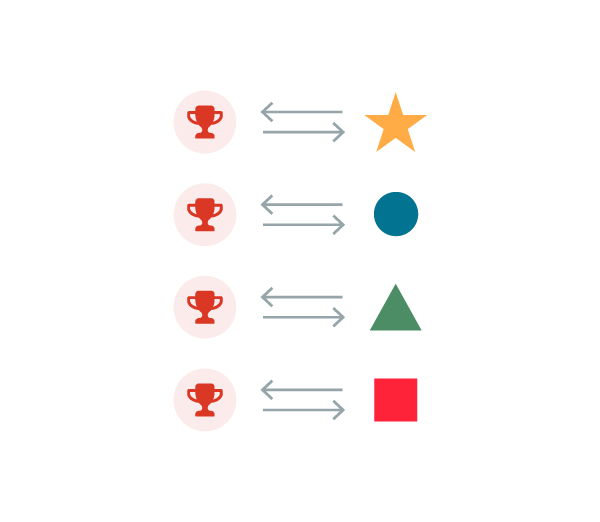
Online Bachelor's in Business Management
Bachelor of Science in Management
Learn how to become a better business manager with an online bachelor’s in business management. Learn what it takes to improve and optimize organizational effectiveness and productivity in a dynamic and evolving workplace. Take coursework in leadership, operations and logistics, project management and strategic management – all of which can help you align resources, improve communication and make key decisions in various industries.
Job-ready skills for your professional profile
Management: Evaluate management principles necessary for organizational effectiveness.
Operations: Analyze interrelationships among distinct functional areas of an organization.

Management: Evaluate management principles necessary for organizational effectiveness.
Operations: Analyze interrelationships among distinct functional areas of an organization.
Strategic Planning: Integrate key problem-solving strategies for business decisions.
Strategic Planning: Integrate key problem-solving strategies for business decisions.

Career-relevant education with real-world value
Program at a glance



Program by the numbers
4 years
Average program length

120 credits
Number of credits required

5 weeks
Course length for the BSM

24/7/365
Online class availability

Time is valuable – don’t spend it repeating coursework. Finish what you started.
Courses for the online bachelor's in business management
Find what you'll learn in a course – look for the skills-aligned trophy cup
Using labor analytics data, we embed the skills you’ll need in the diverse business arena into each course for your online business management degree. You can gain a broad foundation of business knowledge, from operations and performance management to strategic planning, to apply in various management settings.
Requirements and course details
Your course schedule may vary based on transfer credits or credits earned through the University’s Prior Learning Assessment.


Customize your online business management degree with a certificate
You can add a certificate to your online business management bachelor’s degree for no additional time and money. This can potentially give you up to two additional credentials when you graduate. Work with your enrollment representative to add a certificate to your degree as part of your electives.
How skills-aligned learning works
What’s something employers are looking for in job candidates? Skills! That’s why we believe in career-focused education. Our programs are designed to help you demonstrate career-relevant skills and put them into practice within weeks, not years. Here’s how:

Curriculum
We work with a labor market analyst to identify skills today’s employers want in job candidates and embed those skills in our program’s curriculum.

Courses
Each course you take teaches specific career-relevant skills – one skill per credit, on average. For a 3-credit course, you can earn 3 career-relevant skills.

Careers
Demonstrate your newly acquired skills, earn badges, build your professional profile and show potential employers what you bring to the table.
Career opportunities with an online bachelor's in business management
Our program isn’t just about earning an online business management degree – it’s about getting ready for your career. Learn practical knowledge and develop job-ready skills to prepare for roles as a business manager, general manager, operations manager and more.




Career guide
Business manager
If you possess a talent for strategic planning and have a sharp instinct for decision-making, you may have a future in the business manager career.


Career outlook
1.2 million job openings
According to the Bureau of Labor Statistics , about 1.2 million openings for management occupations are projected each year, on average, from 2023 to 2033.
The BLS Projected Growth for 2023-2033 is published by the US Bureau of Labor Statistics. This data reflects the BLS’ projections of national (not local) conditions. These data points are not specific to University of Phoenix students or graduates.

Career stories
“
The courses that I took provided a lot of relevance to me. … I felt like [they] were applicable to what I was doing and everyday life.”
Matthew P., BSM, 2023

- Matthew P., BSM, 2023
- Vernon W., BSM, 2012, MBA, 2021
Cost and savings
Paying for school
Tuition is based on number of credit hours per course. Courses are typically 3 credits, but can range from 1-6 credits. Costs do not include savings opportunities like transfer credits and scholarships.
What affects the overall cost of my program?
Your full program cost can vary by:
- Savings opportunities. Your cost could be reduced with eligible transfer credits, scholarships, employer discounts and more. Students with eligible credits and relevant experience on average saved $11K and 1 year off their undergraduate degree at University of Phoenix.
With our Tuition Guarantee, you pay one flat, affordable rate from the moment you enroll to the day you graduate from your program.
Discover ways to save time and money on your degree with our Savings Explorer® tool:
Other ways to save on time and tuition
Because we believe everyone deserves an affordable education, we work hard to help our students achieve one. Here’s a few ways you can save time, save money and avoid starting from scratch.
Transfer credits
Your prior eligible college credits can lower your cost and help you graduate sooner. As a transfer-friendly university, we accept eligible credits from 5,000+ accredited institutions.
Employer tuition benefits
Are you employed? Check to see if your employer has an alliance agreement with us for education benefits. This can help you save money while gaining skills that could apply to your job.
Credit for life experience
We look at all your relevant experience, from parenting to past jobs, to help you get the college credits you deserve. For every 3 credits earned, shave 5 weeks off your degree.
- View 1
- View 2
- View 3

Budget & borrow
How to pay for college
Paying for school can be intimidating, but we’re here to help you make sense of it. Our finance advisors can walk you through your options like federal financial aid and savings opportunities to minimize your debt. Plus, we can help you figure out your financial plan.
Why choose us?
Where you earn your degree matters

Career-relevant skills
Every five weeks, you can develop career-relevant skills, track your progress in each class and showcase your achievements using your personal skills profile.

Real-world faculty
Your instructors know what works in the real world. As leaders in the field, they bring a hands-on perspective and practical knowledge to the classroom.

Flexible learning + support
Balance it all — work, family and school — with a university built for busy adults like you. Plus, get personal support by phone, chat or email — day or night.

Career Services for Life® commitment
Because your career never stands still, active students get access to career services and resources, from your first class to graduation and beyond, at no added cost.

Dean spotlight
Learn from accomplished business professionals
“
I’m dedicated to equipping students with the knowledge, skills and abilities to pursue their career goals."
Kathryn Uhles, MSP, MIS
Dean, College of Business and Information Technology

Accreditation
Accredited for 45+ years
Since 1978, University of Phoenix has maintained institutional accreditation by the Higher Learning Commission (HLC), hlcommission.org . Learn more about the value of University of Phoenix accreditation and how it benefits our students.
Frequently asked questions about the online bachelor’s in business management
Articles related to the online business management degree
While widely available, not all programs are available to residents of all states. Please check with a University Enrollment Representative.











